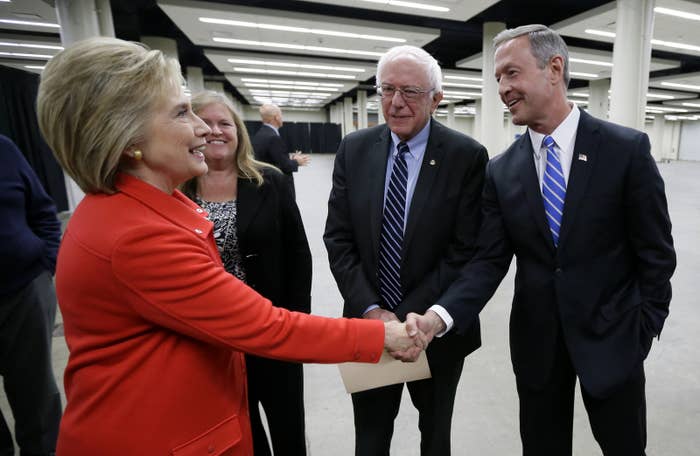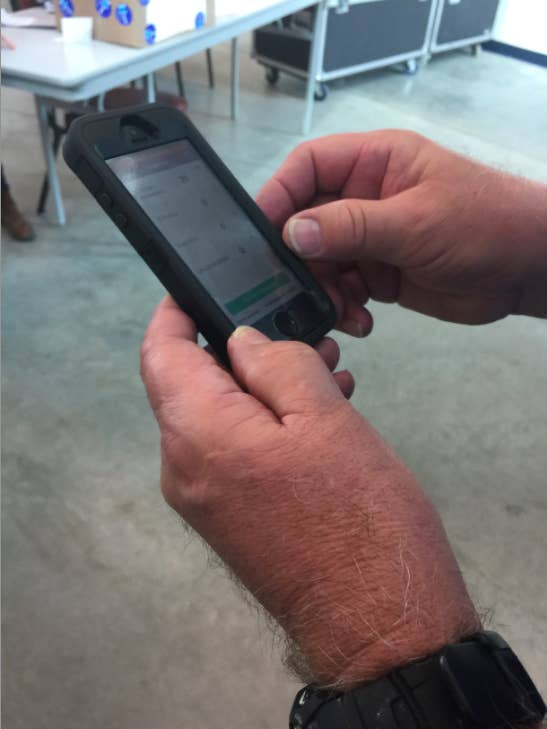
Hillary Clinton's campaign for president is instructing its Iowa caucus leaders to — in certain cases — throw support to former Maryland Gov. Martin O'Malley, with the goal blocking her main opponent, Vermont Sen. Bernie Sanders, from securing additional delegates.
The tactical move is rooted in the complex math of the Iowa caucuses Monday night, where the campaign is looking to defeat Sanders in a state whose caucusgoers have historically backed progressive challengers.
A precinct captain, Jerome Lehtola, confirmed to BuzzFeed News that the campaign has trained precinct captains to release supporters to O'Malley if the move can make him "viable" without hurting Clinton. A Clinton aide said the campaign has trained more than 4,000 volunteer precinct captains to handle a host of different scenarios, including ones where caucusgoers are released to or recruited from another camp.
"Our precinct leadership teams have worked hard to get to know as many people in their precincts as possible and they'll use those relationships to maximize Hillary Clinton's delegate count depending on which groups are viable on caucus night," the aide said.
The goal, in the caucuses' complex terms, is to cost Clinton no delegates in the state's 1,681 caucuses while ensuring stray O'Malley supporters don't defect to Sanders.
This kind of tactical maneuvering is an old Iowa pattern, part of what a former Iowa aide to John Kerry in 2004, Addisu Demissie, described as being part of the state's "brilliantly, gloriously, esoterically small-d democratic" tradition. (Demissie describes the caucus math in excruciating detail in his piece.) The Clinton and Obama campaigns played similar tactical games in 2008, and a deal between Obama's and Bill Richardson's campaigns was controversial enough to be kept top secret at the time. At the time, outraged Clinton aides called reporters to denounce the deal.
This time around, there is no indication that an agreement is involved.
"We're urging all of Gov. O'Malleys supporters to hold strong on caucus night, and we welcome all of Secretary Clinton's supporters to back a real progressive who has actually gotten things done and can build on president Obama's progress," said O'Malley spokeswoman Lis Smith. "Come on over; the water is warm!"

And in 2016, of course, there's an app for that.
The software, which Lehtola showed BuzzFeed News on his iPhone, allows them to enter the complete number of attendees at a given caucus, and then to divvy them up by candidate. The app shows how many supporters each candidate needs to reach their thresholds. Precinct captains can then calculate easily whether, say, Clinton can — without cost to her own delegate count — boost O'Malley to a viability. And they've been trained, Lehtola said, in that maneuver.
A senior Sanders caucus strategist, who also spoke on background, allowed that caucus rules allow for these kind of math games, but said the Sanders campaign has no similar plan. They have trained their volunteers to play it straight, the strategist said — try to get as many people to the caucus site as possible, and then try to recruit caucus goers from among the candidates not deemed to be viable.
A spokesperson reacted much more strongly.
"It's sad and telling that their campaign doesn't think they can win without these kinds of tactics," said Rania Batrice, Sanders's Iowa spokesperson. "At the end of the day though, we believe in the caucus process and know it's in the very capable hands of Iowans."
Still, the tactic depends on the willingness of Clinton's supporters to act tactically, and everyday Iowans don't always make disciplined cadres.
"That's what they told us in the training sessions — I'm not sure how well it's going to work," said Lehtola, 69, a retired hospital worker who is a Clinton's precinct captain in Iowa Falls, and who showed off the app's ease of use to a BuzzFeed News reporter.
Lehtola, standing in back as supporters waited to hear form former President Bill Clinton, said he was most worried about the deep divisions between Clinton and Sanders supporters, and among Americans more broadly.
"I'm a Vietnam vet, and I'm just hoping it doesn't get that ugly again in this country, " he said. "It's so polarized again."



